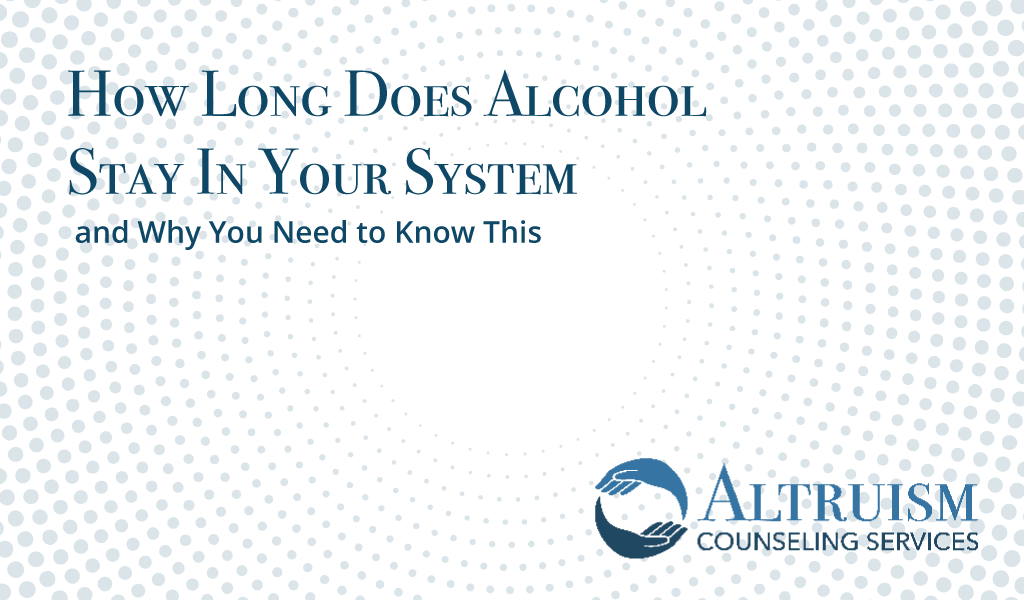
Alcohol consumption is a normal part of American culture. It’s common to get a drink while out with friends, grab a beer at a concert, or have a glass of wine with dinner. Drinking can be part of a healthy lifestyle. But sometimes drinking gets out of hand.
If you are worried about your drinking, you’re not alone. In the state of Kentucky, nearly 1 in 10 people reported having an alcohol use disorder (AUD) in 2022. If you’re concerned that you or a loved one has AUD, it’s normal to have questions.
At Altruism Counseling Services, we know that working through the root causes of AUD is fundamental to recovery. That’s why we offer individual counseling as well as group therapy for people living with AUD.
Today, let’s answer the question: how long does alcohol stay in the body?
Alcohol is usually considered “in your system” when it is in the bloodstream. Alcohol can usually be detected in your system up to 24 hours after you last consumed it. For very heavy drinkers, it may be detected as much as 72 hours after drinking.
However, alcohol does not affect you for nearly that long. Alcohol only creates an intoxicating effect while it is in your bloodstream in large quantities, which lasts for about an hour to an hour and a half per standard drink.
Examples of a standard drink include:
There are four major factors that impact how long alcohol stays in your system.
The standard way to measure the amount of alcohol in your body is blood alcohol concentration (BAC). BAC is calculated by measuring the grams of alcohol per 100 milliliters of blood. BAC is then presented as the percentage of your blood that is made up of alcohol by volume.
In the United States, .08% BAC is the legal limit for people 21 and older who are driving, and .02 for people younger than 21. Some states have additional penalties for higher BAC numbers, although Kentucky does not.
When your BAC is elevated, you are actively feeling the effects of intoxication. Your BAC begins to dissipate within an hour to an hour and a half of your last standard drink.
BAC is typically tested through a breathalyzer, which can pick up traces of alcohol for as long as 24 hours after your last drink. Other tests can measure whether or not there are traces of alcohol in your system after it has left your bloodstream. Still, they cannot usually measure the quantity as effectively as a breathalyzer does.
Your tolerance for alcohol impacts how strongly you feel the effects of alcohol. Basically, this means that as your tolerance for alcohol goes up, so does the amount of alcohol you need to feel the same effects.
However, your tolerance for alcohol does not impact your BAC. Your alcohol tolerance is simply how “used” to the effects of alcohol your body is, it does not change how much alcohol is in your blood. Your tolerance also does not have any impact on how quickly your body metabolizes alcohol.

Alcohol is processed via the digestive system. Alcohol does not require as extensive digestion as solid food, and most of it is absorbed into the bloodstream through the stomach lining and upper part of the small intestines.
Alcohol is carried through the bloodstream to the brain and other parts of the body, which is how you feel the effects of intoxication. Over time, alcohol makes its way through the liver, where it is metabolized and filtered out of the blood.
As a result of long-term alcohol use, you could develop alcohol-related liver disease (ALD). ALD can lead to inflammation of the liver, cirrhosis of the liver, and ultimately liver failure. The more damage the liver takes, the more difficult it becomes for the organ to metabolize alcohol. This can result in alcohol staying in your system for hours longer than average. The best treatment for ALD is to stop consuming alcohol altogether.
There are several tests that can be used to determine if you or someone else has recently consumed alcohol. These tests can be used for pre-employment screenings. It is common to receive an alcohol detection test, like a breathalyzer, if you are pulled over on suspicion of driving under the influence.
A breathalyzer or any other test that measures your BAC can detect alcohol in the blood for about 24 hours after your last drink. Most saliva tests also measure BAC.
An ethanol glucuronide (EtG) urine test tests for the sugars that are produced as a byproduct of alcohol in the body. This means the test can pick up on indicators that you have recently consumed alcohol even after it is no longer in your blood. These tests are usually effective for about 48 hours after your last drink, but some can detect up to 80 hours later.
Hair tests can indicate whether or not you have consumed alcohol in the last 90 days. However, these tests do not indicate the quantity of alcohol you have consumed.
There are lots of myths about sobering up fast. But the truth is that after alcohol has been absorbed into the bloodstream, time is the only thing that is going to get it out of your system.
You have likely heard that coffee or a cold shower will help you sober up quicker. Caffeine and freezing water will help you feel more awake, but it won’t do anything to reduce your BAC.
Many people also believe that vomiting will help them sober up. While you might feel better after throwing up, it does not sober you up unless you do so immediately after drinking.
There is also no evidence that “hangover pills” or herbal remedies are an effective means of ridding your body of the effects of alcohol. The best way to sober up is to rest and let the alcohol make its way through your body.

If you’re living with AUD, the thought of pursuing treatment may be overwhelming. But you are worth the effort it takes to start recovery.
An outpatient Lexington alcoholism treatment center might be the right fit for you. Outpatient treatment can focus on the principles of 12-step programs. A good program can also use cognitive behavioral therapy and group therapy to aid in your recovery. Reaching out for help is the first step towards recovery.
Altruism Counseling is located in Lexington, Kentucky, and focuses on counseling individuals with substance use disorders, including alcohol use disorder. We accept Medicaid, Medicare, and commercial insurance. We also offer cash payment options because we never want finances to create a barrier to recovery. We’re determined to help you discover the root causes of your alcohol use disorder so you can conquer it for good, and we do that by addressing mental health concerns alongside your alcohol use. It’s easy to get lost in AUD, but we’re here to help you find yourself. Give us a call at 859-310-6505 to get started.
Altruism Counseling: Find yourself.